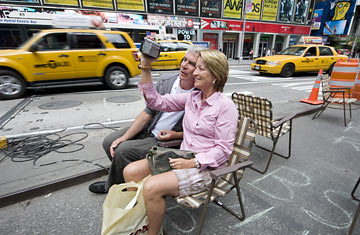
Two German tourists make a video while seated in lawn chairs on a closed section of Broadway in Times Square.
Health care legislation may be garnering most of the headlines these days, but it's far from the only bill circulating on Capitol Hill. Another new piece of legislation quietly making its way to President Obama's desk is the Travel Promotion Act (TPA) — it has already been approved by the Senate and is now in front of the House — which would establish the country's first official nonprofit tourism board.
Virtually every country in the world, large and small, has an official tourism department to woo visitors to its shores. Tiny Tunisia has 24 tourism offices in 19 countries across the globe. South Africa has 10 offices on four continents. America has none, relying instead on the private sector to attract tourists. "Airlines, tour operators, hotels — they've had the responsibility of promoting America," says Henry Harteveldt, a travel industry analyst at Forrester Research in San Francisco. "The government has stayed away from these kinds of initiatives and as a result, we've lost out on travelers."
Indeed, while annual international travel has increased, from 124 million global travelers in 2000 to 173 million last year, annual overseas visits by foreigners to the United States have ticked down, from 26 million in 2000 to 25.3 million in 2008. The absolute drop-off seems small, until you consider that it has cost the country an estimated $27 billion in lost tax revenue over the past decade. With unemployment levels now topping 10% in the U.S., the economic benefits of foreign travel have never been more urgent, yet visitors have never been scarcer. "We're welcoming fewer and fewer visitors every year," laments Geoff Freeman, senior vice president of public affairs at U.S Travel, the nation's leading travel industry advocacy group.
Helping keep travelers at bay are tighter visa restrictions, tougher entry procedures at immigration desks and a general increase in anti-American sentiment in the wake of the wars in Iraq and Afghanistan. "We took foreign travelers for granted and erroneously assumed they would just keep on coming," says Harteveldt.
Washington-watchers expect the TPA to pass the Senate by the end of the year. Once enacted, it will create two new entities — the Office of Travel Promotion and the Corporation for Travel Promotion — to help foreign visitors actually get into the country. The offices will serve as resources for both individual travelers and the travel industry, explaining visa regulations and entry requirements, offering destination data and sponsoring marketing campaigns. Most importantly, by promoting the entire nation — rather than a specific airline or destination — TPA supporters say the bill could entice up to 1.6 million additional tourists to visit America each year. That translates to an estimated $4 billion in economic benefits, potentially resulting in some 40,000 new jobs.
"The new law is fundamentally about creating jobs and encouraging economic activity," explains Senator Byron Dorgan (D-ND), the bill's main sponsor and a leading member of the Senate Subcommittee on Transportation, Housing and Urban Development. "It will also help put a better public face on the nation," Dorgan adds. "While other countries are working hard to woo travelers, we seem to be sending a message that we don't want them here."
The TPA would have a budget of up to $200 million, funded by contributions from the private sector (hotels and airlines, for instance) and a new $10 fee that would be paid by any entering foreign visitor who does not require an entry visa. The latter element has proven controversial — especially to the mostly European travelers who would have to contend with those extra costs. Ambassador John Bruton, head of the European Commission delegation to the United States, called the potential levy "discriminatory" in a September statement, and warned that it could become "a step backward in our joint endeavor toward transatlantic mobility."
Although the fee will likely be "hidden" within airfares, Harteveldt is concerned that it could ultimately work against TPA initiatives and "come back to haunt us." But Senator Dorgan counters that $10 is far lower than similar fees — ranging from Ireland's $14 entry tax to the U.K.'s whopping $100 — paid by Americans when they travel abroad. And with a mere 35 countries that would be required to pay the fee, fewer than 30% of foreign travelers will be affected.
It's been more than a decade since the U.S. Government first attempted to form an official tourism office. In 1996, under President Bill Clinton, the U.S. National Tourism Organization was launched, only to be abandoned three years later due to inadequate Congressional funding — as were subsequent efforts in 2001 and 2003. But as the 2009 Travel Promotion Act makes its way through Congress, it appears to have garnered enough support to be passed into law — and funded into action. U.S. Travel's Freeman concedes it will probably be another year before the Office of Travel Promotion is fully up and running. But he is confident that Washington will recognize the benefit of increased foreign travel to the nation's fiscal recovery. "This is the low-hanging fruit to fixing the economy," Freeman says. "It's about as obvious a solution as you can imagine — and we think Secretary Clinton and President Obama clearly recognize this."
